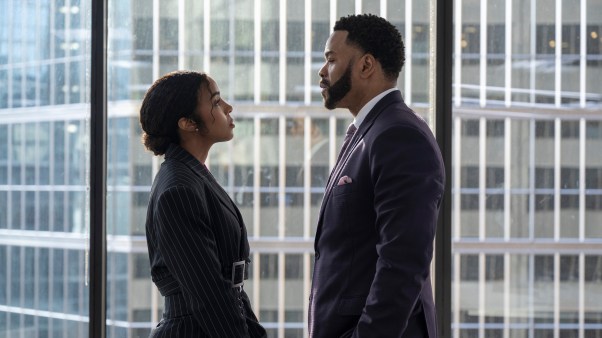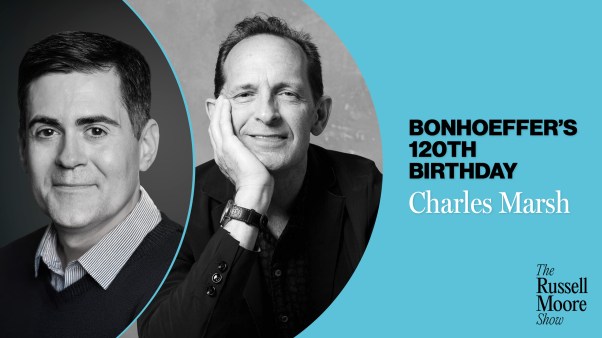Weeks before his installation as the first Black lead pastor at one of the most influential churches in the Washington, DC, area, Mike Kelsey came across a dissertation written by a distant relative, theologian and social ethicist George D. Kelsey.
His great-great-great-uncle detailed the clashes around race and integration among Southern Baptists half a century ago. A professor at Morehouse College, he wrote about how racism was especially problematic within Christian communities, disrupting the neighborly love that was supposed to draw together the body of Christ.
As the younger Kelsey steps up to lead McLean Bible Church, he represents an exceptional case in today’s US evangelical landscape—perhaps the most prominent example of a Black minister rising to the top position at a historically white megachurch. But he’s also lived through a contemporary version of the faith and justice fights chronicled by his forebear.
Over Kelsey’s 16 years preaching and pastoring at McLean, he watched the nondenominational congregation and its leadership grow more diverse as DC did. Across five locations, McLean counts members from over a hundred countries now. There were answered prayers, lessons learned, and moments of unity along the way, but it didn’t come easy. His wife remembers that even just a handful of years ago, people were saying Kelsey could never lead the church.
From the start, Kelsey experienced the culture shock of the megachurch setting. He felt the sting of congregants who dismissed Barack Obama’s election to the White House, the pressure of preaching boldly amid a string of high-profile Black deaths and the Black Lives Matter movement, and the tension from internal church conflict spurred on by debates over race and politics during the pandemic.
“I didn’t know any of that coming in. All I saw was the lights and relevance and shorter services, and I didn’t know any of the more substantive benefits and beauties, or challenges and difficulties, and the disconnect” that came with multiethnic ministry, said Kelsey, recalling how he received an email complaint comparing him to Al Sharpton the first time he preached on race at McLean.
“That was my journey of, Oh, there’s something deeper going on here. I’m stepping into a legacy of the Tom Skinners and the Crawford Lorittses and the Tony Evanses and the African American pastors from the Black church who have stepped into predominantly white spaces to be bridge builders.”
At McLean, Kelsey, 41, now shares leadership of the multisite church with pastor David Platt. While both carry the title of lead pastor, Kelsey serves as the primary leader of the team, focusing on reaching the next generation in a secularizing, diversifying context.
Platt—the former president of the Southern Baptist Convention’s International Mission Board who joined McLean as teaching pastor in 2017—will continue to preach and serve, with a particular emphasis on reaching the nations.
In a statement to CT, Platt praised Kelsey’s leadership, preaching, and passion for “spreading the gospel from the next generation to all nations.” He said, “I am a better person and pastor as a result of serving alongside Mike.” The Radical author said McLean is “affirming a new level of plurality of leadership” as it enters a “new chapter.”
The shift in leadership follows a tumultuous few years at McLean, when a faction of the church mounted a lawsuit over a 2021 elder vote, claiming the church was veering from its mission and attempting to “purge conservative members.”
The disagreements at McLean also played out on social media amid the evangelical debates around critical race theory and liberal drift. Critics circulated a clip of Kelsey referring to the impulse to “torch” white people during a podcast discussion about experiencing anger in the aftermath of George Floyd’s killing.
“It was intensely cut out of context, but I wish people could see the whole thing. I use slang in a way that could be easily misunderstood or intensely distorted, but the point I was making is, when it comes to racial issues, a lot of Black people have to fight the urge to be controlled by anger instead of being controlled by the Holy Spirit,” he said. “I know what that feels like, but as a follower of Jesus, Jesus doesn’t give us permission to hold anybody in contempt.”
Kelsey said he learned a lot from that situation, and the church learned a lot from the debates and discussions that came up over the past three and a half years.
“I’m actually very glad that we went through what we went through. It helped us clarify who we are as a church, and we have so much more unity now in a lot of ways because of that,” said Kelsey. “That turbulence actually ended up accelerating what I think God was doing and wanted to do.”
Founded in 1961, McLean Bible Church grew throughout the 1980s, 1990s, and 2000s under the leadership of pastor Lon Solomon. The megachurch added services and moved into larger buildings to accommodate the thousands who showed up on Sundays, including big names from Capitol Hill. The church—at the time, the second-biggest in the state—eventually settled into a complex in Tysons Corner, Virginia.
Back then, Kelsey was sitting in services on the other side of the District, at a Black Baptist church pastored by his father. He grew up knowing a DC that earned its nickname of “Chocolate City.” The Kelseys lived in Prince George’s (“PG”) County, once the richest majority-Black county in the US. He descended from Black ministers on both sides of his family; his father, bishop Michael V. Kelsey Sr., has led New Samaritan Baptist Church in northeast DC for 30 years. His mom’s father had led another local church for 40.
At the University of Maryland, College Park, Kelsey slacked a bit in class as a rhetoric and political culture major but started to follow Jesus during his sophomore year. He joined Alpha Nu Omega, a campus ministry organized in the tradition of Black sororities and fraternities. He had dreamed of being a club owner and concert promoter but instead put on praise productions that packed auditoriums and led dozens of students to profess faith.
“He was attractive. He was popular. He could have been doing a lot of other stuff, honestly, but he was known as the Christian guy on campus,” said Mike Kelsey’s wife, Ashley. They began dating in college.
Mike Kelsey led young adult ministry at his father’s church. Then, his first exposure to Christian life beyond the Black church came when Bishop Kelsey helped organize the 2005 DC Festival put on by the Luis Palau Association. The younger Kelsey ended up working for the international evangelistic ministry for a few years and, through it, connected with McLean, one of the supporting congregations.
In 2005, Ashley Kelsey took a worship and creative arts position with McLean’s young adult ministry, then called Frontline. At the time, she was one of the only women of color working there, yet she wore her hair in an Afro and boldly brought in books on Black history to share with the staff. Two years later, Mike Kelsey joined Frontline, which had 2,500 attendees and 27 staff members.
Within a couple years, McLean launched a campus focused on young adults with Kelsey as its pastor. He went on to serve as campus pastor for its Montgomery County, Maryland, location and as a teaching pastor.
On Sundays these days, Ashley Kelsey leaves for church at 6:30 a.m. to prepare to lead worship at the Maryland location while Mike Kelsey—often donning a hip oversized T-shirt, black-framed glasses, and a megawatt smile—preaches about twice a month from Tysons in Virginia.
Platt and others also preach in rotation. The shared leadership model makes sense for Kelsey, whose ministry colleagues describe him as a humble listener and learner.
“He’s a real peacemaker, someone who loves Christ’s people, and someone who does not seek or need applause,” said Thabiti Anyabwile, who said Kelsey was among the first to welcome him when he moved to DC to pastor Anacostia River Church.
During an interview with CT, Kelsey kept bringing up names of fellow pastors as examples of people he had learned from or went to with questions.
Early on at McLean, he said, a friend of his dad’s connected him with Bryan Loritts, who also had experienced being the first or only Black pastor on staff at a majority white church. Loritts advised him to examine his calling, love his flock, and be willing to see his assumptions about white evangelicals challenged.
Kelsey credits McLean pastor emeritus Solomon and former associate senior pastor Dale Sutherland with letting him be himself and find his voice and the current leadership team with helping him grow more thoughtful and slower to speak. He says he wishes that he had been more explicit in 2020 and 2021 to call out not just the lingering impact of white supremacy but the legacy of a white Christian tradition committed to faithful sacrifice and justice.
“Even when it comes to a multiethnic church,” he said, “I want our white brothers and sisters to [know] your whiteness is not something you have to apologize for. It is something that you bring to the table in all kinds of ways.”
Kelsey also looked to others to help fill in his own blind spots as a leader. He became friends with Maryland pastor Mitchel Lee through a local preaching cohort and turned to Lee to learn about cultural and theological distinctives among Asian American Christians, particularly as anti-Asian sentiment swelled over the pandemic.
They swap stories about their experiences leading megachurches that are growing in diversity. Lee has been lead pastor of Grace Community Church, a congregation of about 3,000, for the past seven years. He talked about the “parallel pruning” he saw at Grace and McLean due to the tensions that arose in 2020. Lee even led his church in prayer for McLean as it went through the process of affirming leadership amid vocal critique.
But Lee also recognized the cultural differences in their experiences in multiethnic ministry.
“Out of a Korean American background, when I became the lead pastor, it was like the evangelical Linsanity. Like, One of our guys made it! Look at this! When Mike got some of his role at McLean, the Black church didn’t receive it that way. It wasn’t like, One of ours made it—it was, Why are you leaving us?” Lee said. “Those were really sacred moments to share. Your experience is very different than mine, but God has called us to such similar spaces.”
Kelsey told CT his involvement at McLean felt like a sore spot at times with his family. He referenced the concept popularized by W. E. B. Du Bois of the “talented tenth,” the idea that college-educated African Americans should dedicate their careers to bettering the Black community.
“A lot of African American pastors and African American people in general have been really taken advantage of,” Kelsey said. “McLean can be seen as Walmart—just takes all the jobs and swoops in.”
Bishop Kelsey said when his son joined the staff at the megachurch, he and his wife talked about it and prayed about it, but their thinking came down to what they saw as the will of God.
“We found a bottom line, and that bottom line was the leading of the Lord,” he said. “It became clear that it was God, that it was not Mike. He did not pursue it. It was God who was opening doors.”
Some Black Christians returned to the Black church as a refuge in 2020, so they wouldn’t have to be in the position of wondering whether their predominantly white congregations would address issues of racial justice or acknowledge their suffering. Ashley Kelsey said she could see why. In pain and frustration, she brought her questions to God in prayer.
While sitting around the kitchen table discussing their future at McLean, her father-in-law asked, “Do you think that the Lord brought you to this place?” Looking back on the trajectory she and her husband had taken, she thought it had to be God.
“Even the way David [Platt] came in and said, ‘I feel like we need to kind of switch roles.’ That was very unexpected,” Ashley Kelsey said. “So I’m like, Okay, Lord … You’ve kept us here. We’ve had a lot of highs and we’ve had some low lows. When I look back on it, I’m thinking, Well, was this what you were doing?”
When Bishop Kelsey posted a family photo from his grandkids’ baptism on Instagram a few weeks ago, he tagged both New Samaritan and McLean, a sign of the dual church heritage in his family. When he occasionally drops in on a service to hear his oldest preach, Bishop Kelsey feels like a coach or a proud father sitting on the sidelines—on the edge of his seat, ready to help somehow. But that changed the last time he visited.
“At one point in his message, I remember sitting back as I heard the Lord say, Relax. He’s got this. Enjoy what I am doing through your son,” he said. “You don’t know how good that feels.”
And the senior Kelsey will preach at McLean for the first time on Sunday, offering the main charge at his son’s installation service. Kelsey was affirmed by a congregational vote in September (he had been named a lead pastor in 2020 but had to be voted in by the congregation this year after McLean adopted new constitutional requirements). This event represents his commissioning into the new role leading the lead pastor team and is inspired by Black church tradition.
“That’s a really significant moment for our family,” said the younger Kelsey. “But more broadly than that, I think it’s a significant illustration of who we’re trying to become [at McLean]—allowing a prominent DC pastor, an inner city, Black church pastor, to speak authoritatively into our church.”
Bishop Kelsey remembers the pastoral charge given to him three decades ago during a “next-level” weekend of celebration. He plans to offer a similar message to Mike, urging him to be consistent, committed, and consecrated. He said it’s the same charge he would have given his son if he were leading a Black church.
“I know some of the realities of being a Black lead pastor in a context where there hasn’t been one before,” he said, “but those do not exceed the fact that the kingdom is the kingdom.”
Lifeway Research statistics show that about 15 percent of lead pastors will step away over the next decade, the top reasons being a change in calling, church conflict, and burnout. The pressures can be even more acute in multiethnic fellowships like McLean. Though multiethnic ministry has long been a buzzword and aim among church planters, the reality has proven much harder, as scholar Korie Little Edwards wrote.
“Diversity is becoming more of a pronounced and felt need. I am constantly inundated with requests from well-intentioned white leaders to help them find ‘Mike Kelsey.’ On the other hand, things feel far worse. My own father, when he retired from his church in 2021, said things were as bad now racially within the church as they had ever been in his lifetime,” said Bryan Loritts, teaching pastor at The Summit Church in North Carolina.
“The pandemic, 2020 election, Donald Trump, Ahmaud Arbery / Breonna Taylor / George Floyd, outcries of CRT/woke, etc.—if they have not widened the divide, certainly it has made it feel as if the divide has widened.”
The significance of Kelsey’s leadership in the long term may depend on the authority and voice he’s given to lead.
“In the long history of the American church, there are not many examples of African American men taking the helm of predominantly white churches. Mike joins a handful of such servants working across ethnic lines for the greater unity of the body of Christ,” said Anyabwile. “The most optimistic take is that his assuming the role at MBC signals an opportunity for more churches to benefit from team leadership structures and increased practice of shared authority. If it becomes a genuine trend, it could be healing in a thousand ways.”
Even with the stress and nerves of taking on the organizational leadership of a church that draws 5,500 in person and around 30,000 online each week, Kelsey says he’s excited for the opportunity. And he’s praying for deeper unity and discipleship at McLean.
“I would love to have all kinds of Republican and Democrat movers and shakers in our church and have them all feel the equal weight of the call to discipleship. I would love for all kinds of different ethnic groups and racial groups in our church to bring their full selves into our church,” he told CT. “When it comes to politics and race and all those things, we still want to lean into that. We still believe in a diverse, multiethnic church, just not at the expense of truth, justice, and holistic discipleship.”
Correction: Wade Burnett had been named a lead pastor along with Kelsey in 2020 but currently holds the title of executive pastor.















